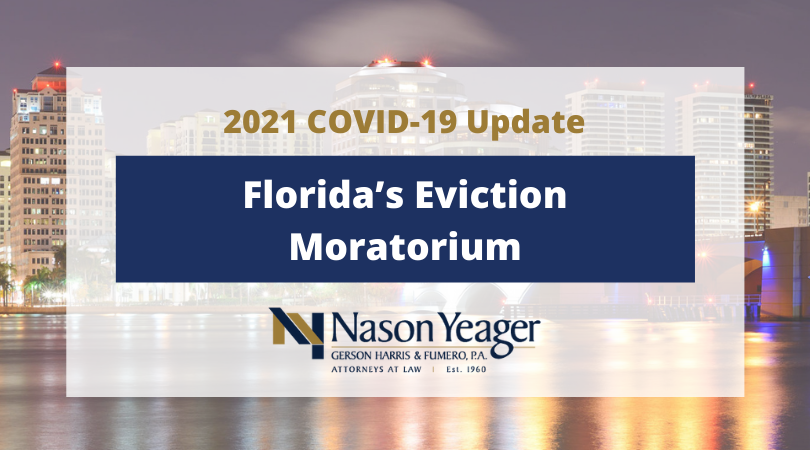On August 31, 2020, Governor Ron Desantis executed Executive Order 20-180; which caused Florida’s residential eviction moratorium to expire on September 1, 2020. Nonetheless, residential tenants in Florida may continue to seek relief from eviction due to non-payment of rent under the federal residential eviction moratorium, which remains in effect. At the direction of President Joe Biden, the Centers for Disease Control and Prevention (“CDC”) extended the federal residential eviction moratorium for residential tenants through at least March 31, 2021.
Originally issued on September 4, 2020, the “Temporary Halt In Residential Evictions to Prevent the Further Spread of COVID-19” (the “CDC Order”) provides relief to residential tenants. The CDC Order does not affect residential or commercial mortgages, nor does it affect commercial leases. Single and multi-family property owners may qualify for COVID-19 related financial relief only in connection with certain federally backed mortgages in accordance with Federal Housing Finance Agency guidelines, as part of a governmental program that is separate from the CDC Order.
The CDC Order applies in any state, local, territorial, or tribal area without a moratorium on residential evictions that provides the same or greater level of public-health protection than the federal eviction moratorium. Therefore, because Florida’s residential eviction moratorium is expired, the CDC Order applies in Florida, unless some county, municipal, or other local rule, order, or ordinance provides the same or greater relief than the provisions of the CDC Order.
To obtain relief under the CDC Order temporarily halting residential evictions, residential tenants must execute a declaration, under penalty of perjury, that they: 1) have used their best efforts to obtain all available government assistance for rent or housing; 2) earn less than $99,000 per year (or $198,000 if filing a joint tax return), were not required to report any income in 2020 to the U.S. Internal Revenue Service, or received a stimulus check pursuant to the CARES Act; 3) are unable to pay full rent or housing payment due to substantial loss of household income or extraordinary out-of-pocket medical expenses; 4) are using best efforts to make timely partial payments that are as close to the full payment as possible; 5) and will likely become homeless if they are evicted. To view the official list of declarations necessary to obtain eviction relief as a residential tenant, please see the CDC Declaration Form here.
If a residential tenant declares that they are a covered person under the CDC Order, they may not be evicted solely on the basis of non-payment of rent at any time during the effective period of the CDC Order. The CDC Order does not preclude a residential landlord from challenging the truthfulness of a tenant’s coverage declaration in a judicial or administrative proceeding. The CDC Order “does not relieve any individual of any obligation to pay rent, make a housing payment, or comply with any other obligation that the individual may have under a tenancy, lease, or similar contract.” Residential landlords may still charge or collect late fees, penalties, or interest as a result of the failure to pay rent on a timely basis pursuant to the terms of any applicable contract. The effective period of the current CDC Order is through March 31, 2021, but may be extended by superseding order.
If a covered tenant breaches a rental agreement for some reason other than non-payment of rent, the landlord may successfully maintain an eviction proceeding against that tenant. The CDC Order specifically enumerates five circumstances in which a residential tenant may be evicted and the landlord may obtain possession of the rental premises: (1) engaging in criminal activity while on the premises; (2) threatening the health or safety of other residents; (3) damaging or posing an immediate and significant risk of damage to property; (4) violating any applicable building code, health ordinance, or similar regulation relating to health and safety; or (5) violating any other contractual obligation, other than the timely payment of rent or similar housing-related payment (including non-payment or late payment of fees, penalties, or interest).
Residential eviction proceedings in Florida must continue to adhere to the Florida Residential Landlord Tenant Act (Fla. Stat. §§ 83.40 – 83.683) and expedited procedure laws found in Florida Statute § 51.011. Once a tenant is served with a lawsuit for eviction, the tenant has only five (5) business days to respond. If the tenant fails to respond within the five day period, the court may enter a default judgment. Upon successfully evicting a tenant, a residential landlord may be entitled to reasonable attorneys’ fees in connection with the proceeding.
Our firm stands ready to service our clients and friends in these unprecedented times. If you have any questions about commercial or residential evictions, please do not hesitate to contact our offices for help.
